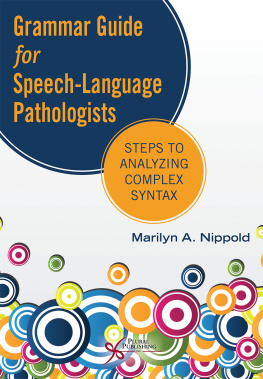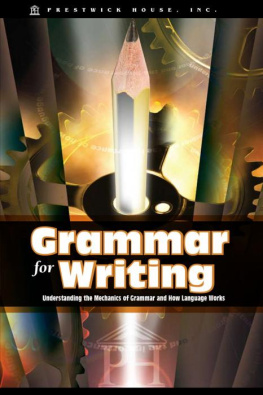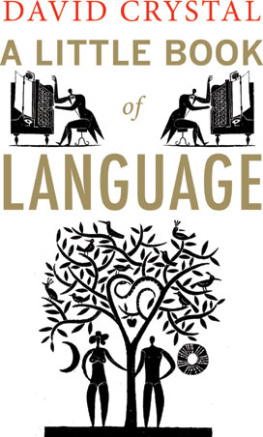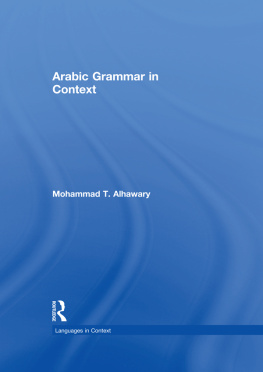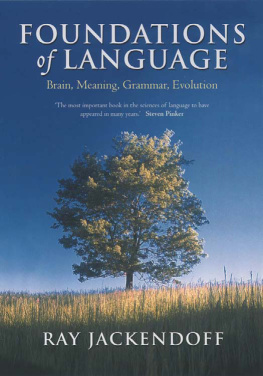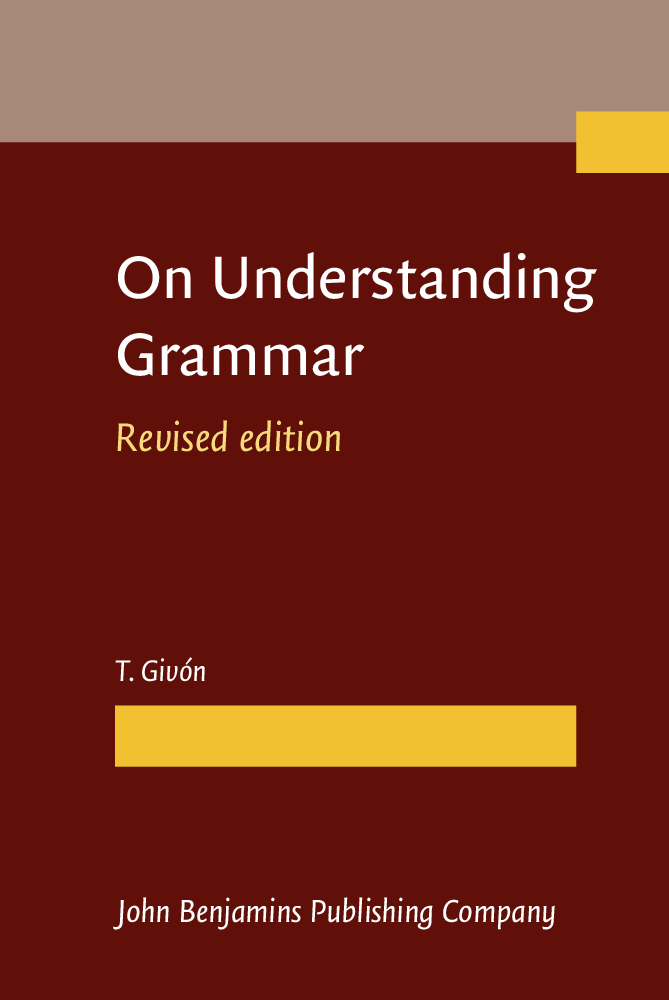

On Understanding Grammar
Revised edition
T. Givn University of Oregon
doi: 10.1075/z.213
ISBN: 978 90 272 6471 8 (ebook)
Cataloging-in-Publication Data available from Library of Congress:
LCCN 2017045529
2017 John Benjamins B.V.
No part of this book may be reproduced in any form, by print, photoprint, microfilm, or any other means, without written permission from the publisher.
John Benjamins Publishing Company https://benjamins.com
John Benjamins Publishing Company
Amsterdam/Philadelphia
Dedication
For Linda
Foreword to the 1979 edition
The next best thing to being a mother or a midwife is to be the witness to the growth of an infant when later one is asked to foretell its promise. With T. Givns On Understanding Grammar I have been a happy onlooker since chapter 1, and for what my prophetic skills may be worth, I foresee it as one of the truly prizes statements of our current knowledge to appear in this decade. The author has said with his usual modesty that it is a consolidation of viewpoints rather than a promulgation of discoveries. That may be. But in the process of consolidation, it usually turns out that an old light in one field takes on a new brilliance in another. That is one, just one, of the virtues of this book: Well before its conception the author had made his leap away from the tunnel vision of so much of our contemporary formalism. He had explored the tunnel and knew it from end to end; but he has since amassed a knowledge of languages that has few rivals; his familiarity with linguistic history and more than a nodding acquaintance with logic, pragmatics, evolutionary theory and philosophy brings a formidable learning to bear on a discipline whose breadth makes such learning indispensable. The book is rich in insights, even for those who have been with linguistics for a long time. And beginners could be thankful for having it as a starting point, from which so many past mistakes have been shed.
This is a book about understanding that is done with deep understanding of language and its place in Nature and in the nature of humankind. And with understanding of how these things can be revealed. It is an unpretentious book; the lessons are taught with no display, on the authority of a scholarship that is too thorough to vaunt itself, and with an obvious faith in the power of plain language to describe language. Givn shows us again that great truths are simple truths; and if it is not always a simple matter to arrive at them, that increases our debt to him.
Dwight Bolinger
Palo Alto, California
September 1979
Preface to the 1979 edition
This book is about trying to make sense out of doing linguistics and, ultimately, of human language. Making sense has not been a favorite preoccupation of linguists, the best of whom like to keep their nose close to the grindstone of facts. I respect such integrity, and hope to show that an occasional widening of the horizons will not be detrimental to it.
It took me a while to realize that this book could have some overall coherence: It took writing the entire book to find out whether such coherence was even remotely possible. The enterprise began with Sandy Thompson suggesting that maybe it was time to gather in one place all the disparate themes I have been pursuing over ten years. My editor Harry Whitaker then further encouraged me, after a long talk in the summer of 1976, to publish the book under his Neurolinguistics label at Academic Press. I was a bit dubious; I knew the themes themselves had, each, their internal coherence the method, discourse-pragmatics, diachrony, typology, pidgins and creoles, language evolution and ontology. They all had a bearing on why and how one would want to do linguistics. But it was still unclear how they would all coalesce. The field has become increasingly fragmented; there was no integrating precedence; subject areas were locked in their separate boxes; human language had persisted in defying facile inductive or deductive methodologies.
The coherence structure of this book resembles a circle: Language sits at the unmarked center, defiant and wide open. The various chapters topics straddle the rim, focusing upon the elusive center from multiple perspectives. The inter-dependencies among the various perspectives makes for the coherence structure of the book; and if and when we should know those inter-dependency more precisely, they will, one hopes, make the coherence structure of linguistics.
is about the method, thus about the notions of facts, and theory and explanation and their mutual dependence, particularly how those notions manifest themselves in the mundane practice of science.
is about re-defining syntax in terms of its communicative semantic and discourse-pragmatic functions, thus about the relation between the formal properties of syntactic construction and their semantic and pragmatic functions.
is about the discourse-pragmatic function of negative speech acts and how it transcends the traditional propositional-logical analysis, thus a demonstration of the balance between propositional semantics and discourse pragmatics.
is about nominal case-marking systems and the balance between event-scope semantic roles and discourse-scope topicality and reference; then how the formal properties of case-marking systems and their syntactic typology arise out of that balance, in both synchrony and diachrony.
is about grammar as a discourse-processing device, and the balance between grammatical and pre-grammatical communication. The perspective is developmental diachronic, ontogenetic, evolutionary how grammar emerges out of pre-grammar.
is about how grammaticalization, initially motivated by adaptive-communicative considerations, can in its later stages make grammar increasingly convoluted, opaque, and maladaptive.
is about the relation between human language as we currently know it and its protracted evolution, embedding the discussion in the context of evolutionary theory in biology and cultural anthropology.
is about language and ontology, thus about the relation between the cognizing organism and the universe it inhabits and tries to make sense of and communicate about.
I do not claim to have resolved everything in this book. Language is a vast phenomenon; to know all about it is to know all about humanity, its socio-culture and the universe it inhabits the presumably objective universe as well as the universe accessible to the human mind. Such an investigation is in principle hopeless (re. e.g. Kant, Russell, Goedel, Heissenberg). Language is that giant rock we all tunnel into from diverse points of departure, our disparate disciplinary perspectives. We work in our dark corners, hoping to meet some day in the illuminated middle. All I have tried to do here is illuminate my admittedly-narrow span of the tunnel.
What I know about language owes much to many people, both naive speakers and learned teachers. I have tried to acknowledge my many debts at appropriate points throughout the book. There are four people in particular that I have always considered beacons of integrity and common sense in linguistics, a field rife with fads, factionalism and fratricide: Dwight Bolinger, for teaching us that language is best understood in the context of communication; Joseph Greenberg, for refusing to consider the universals of Language without consulting the incredible diversity of languages; Winfred Lehmann, for insisting that synchrony can only be explained in the context of diachrony; and Kenneth Pike, for suggesting that our understanding of language must be ultimately embedded in the cross-disciplinary context of culture, cognition and human-kinds construction of its universe.


